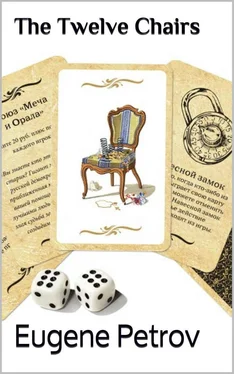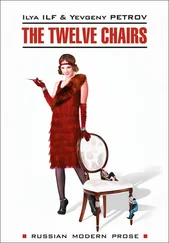Eugene Petrov - The Twelve Chairs
Здесь есть возможность читать онлайн «Eugene Petrov - The Twelve Chairs» весь текст электронной книги совершенно бесплатно (целиком полную версию без сокращений). В некоторых случаях можно слушать аудио, скачать через торрент в формате fb2 и присутствует краткое содержание. Год выпуска: 2013, Жанр: Юмористическая проза, на английском языке. Описание произведения, (предисловие) а так же отзывы посетителей доступны на портале библиотеки ЛибКат.
- Название:The Twelve Chairs
- Автор:
- Жанр:
- Год:2013
- ISBN:нет данных
- Рейтинг книги:5 / 5. Голосов: 1
-
Избранное:Добавить в избранное
- Отзывы:
-
Ваша оценка:
- 100
- 1
- 2
- 3
- 4
- 5
The Twelve Chairs: краткое содержание, описание и аннотация
Предлагаем к чтению аннотацию, описание, краткое содержание или предисловие (зависит от того, что написал сам автор книги «The Twelve Chairs»). Если вы не нашли необходимую информацию о книге — напишите в комментариях, мы постараемся отыскать её.
Find traces of a separate headset difficult and heroes face different adventures and troubles.
The Twelve Chairs — читать онлайн бесплатно полную книгу (весь текст) целиком
Ниже представлен текст книги, разбитый по страницам. Система сохранения места последней прочитанной страницы, позволяет с удобством читать онлайн бесплатно книгу «The Twelve Chairs», без необходимости каждый раз заново искать на чём Вы остановились. Поставьте закладку, и сможете в любой момент перейти на страницу, на которой закончили чтение.
Интервал:
Закладка:
money for the dye."
Ostap came back with a new mixture.
"It's called 'Naiad'. It may be better than the Titanic. Take your coat
off!"
The ceremony of re-dyeing began. But the "Amazing chestnut colour
making the hair soft and fluffy" when mixed with the green of the Titanic
unexpectedly turned Ippolit Matveyevich's head and moustache all colours of
the rainbow.
Vorobyaninov, who had not eaten since morning, furiously cursed all the
perfumeries, both those state-owned and the illegal ones on Little Arnaut
Street in Odessa.
"I don't suppose even Aristide Briand had a moustache like that,"
observed Ostap cheerfully. "However, I don't recommend living in Soviet
Russia with ultra-violet hair like yours. It will have to be shaved off."
"I can't do that," said Ippolit Matveyevich in a deeply grieved voice.
"That's impossible."
"Why? Has it some association or other?"
"I can't do that," repeated Vorobyaninov, lowering his head.
"Then you can stay in the caretaker's room for the rest of your life,
and I'll go for the chairs. The first one is upstairs, by the way."
"All right, shave it then!"
Bender found a pair of scissors and in a flash snipped off the
moustache, which fell silently to the floor. When the hair had been cropped,
the technical adviser took a yellowed Gillette razor from his pocket and a
spare blade from his wallet, and began shaving Ippolit Matveyevich, who was
almost in tears by this time.
"I'm using my last blade on you, so don't forget to credit me with two
roubles for the shave and haircut."
"Why so expensive?" Ippolit managed to ask, although he was convulsed
with grief. "It should only cost forty kopeks."
"For reasons of security, Comrade Field Marshal!" promptly answered
Ostap.
The sufferings of a man whose head is being shaved with a safety razor
are incredible. This became clear to Ippolit Matveyevich from the very
beginning of the operation. But all things come to an end.
"There! The hearing continues! Those suffering from nerves shouldn't
look."
Ippolit Matveyevich shook himself free of the nauseating tufts that
until so recently had been distinguished grey hair, washed himself and,
feeling a strong tingling sensation all over his head, looked at himself in
the mirror for the hundredth time that day. He was unexpectedly pleased by
what he saw. Looking at him was the careworn, but rather youthful, face of
an unemployed actor.
"Right, forward march, the bugle is sounding!" cried Ostap. "I'll make
tracks for the housing division, while you go to the old women."
"I can't," said Ippolit Matveyevich. "It's too painful for me to enter
my own house."
"I see. A touching story. The exiled baron! All right, you go to the
housing division, and I'll get busy here. Our rendezvous will be here in the
caretaker's room. Platoon: 'shun!"
CHAPTER EIGHT
THE BASHFUL CHISELLER
The Assistant Warden of the Second Home of Stargorod Social Security
Administration was a shy little thief. His whole being protested against
stealing, yet it was impossible for him not to steal. He stole and was
ashamed of himself. He stole constantly and was constantly ashamed of
himself, which was why his smoothly shaven cheeks always burned with a blush
of confusion, shame, bashfulness and embarrassment. The assistant warden's
name was Alexander Yakovlevich, and his wife's name was Alexandra
Yakovlevna. He used to call her Sashchen, and she used to call him Alchen.
The world has never seen such a bashful chiseller as Alexander Yakovlevich.
He was not only the assistant warden, but also the chief warden. The
previous one had been dismissed for rudeness to the inmates, and had been
appointed conductor of a symphony orchestra. Alchen was completely different
from his ill-bred boss. Under the system of fuller workdays, he took upon
himself the running of the home, treating the pensioners with marked
courtesy, and introducing important reforms and innovations.
Ostap Bender pulled the heavy oak door of the Vorobyaninov home and
found himself in the hall. There was a smell of burnt porridge. From the
upstairs rooms came the confused sound of voices, like a distant "hooray"
from a line of troops. There was no one about and no one appeared. An oak
staircase with two flights of once-lacquered stairs led upward. Only the
rings were now left; there was no sign of the stair rods that had once held
the carpet in place.
"The Comanche chief lived in vulgar luxury," thought Ostap as he went
upstairs.
In the first room, which was spacious and light, fifteen or so old
women in dresses made of the cheapest mouse-grey woollen cloth were sitting
in a circle.
Craning their necks and keeping their eyes on a healthy-looking man in
the middle, the old women were singing:
"We hear the sound of distant jingling,
The troika's on its round;
Far into the distant stretches
The sparkling snowy ground."
The choirmaster, wearing a shirt and trousers of the same mouse-grey
material, was beating time with both hands and, turning from side to side,
kept shouting:
"Descants, softer! Kokushkin, not so loud!"
He caught sight of Ostap, but unable to restrain the movement of his
hands, merely glanced at the newcomer and continued conducting. The choir
increased its volume with an effort, as though singing through a pillow.
"Ta-ta-ta, ta-ta-ta, ta-ta-ta,
Te-ro-rom, tu-ru-rum, tu-ru-rum . . ."
"Can you tell me where I can find the assistant warden?" asked Ostap,
breaking into the first pause.
"What do you want, Comrade?"
Ostap shook the conductor's hand and inquired amiably: "National
folk-songs? Very interesting! I'm the fire inspector."
The assistant warden looked ashamed.
"Yes, yes," he said, with embarrassment. "Very opportune. I was
actually going to write you a report."
"There's nothing to worry about," said Ostap magnanimously. "I'll write
the report myself. Let's take a look at the premises."
Alchen dismissed the choir with a wave of his hand, and the old women
made off with little steps of delight.
"Come this way," invited the assistant warden.
Before going any further, Ostap scrutinized the furniture in the first
room. It consisted of a table, two garden benches with iron legs (one of
them had the name "Nicky" carved on the back), and a light-brown harmonium.
"Do they use primus stoves or anything of that kind in this room?"
"No, no. This is where our recreational activities are held. We have a
choir, and drama, painting, drawing, and music circles."
When he reached the word "music" Alexander Yakovlevich blushed. First
his chin turned red, then his forehead and cheeks. Alchen felt very ashamed.
He had sold all the instruments belonging to the wind section a long time
before. The feeble lungs of the old women had never produced anything more
than a puppy-like squeak from them, anyway. It was ridiculous to see such a
mass of metal in so helpless a condition. Alchen had not been able to resist
selling the wind section, and now he felt very guilty.
A slogan written in large letters on a piece of the same mouse-grey
woollen cloth spanned the wall between the windows. It said:
A BRASS BAND IS THE PATH
TO COLLECTIVE CREATIVITY
"Very good," said Ostap. "This recreation room does not constitute a
fire hazard. Let's go on."
Passing through the front rooms of Vorobyaninov's house, Ostap could
Читать дальшеИнтервал:
Закладка:
Похожие книги на «The Twelve Chairs»
Представляем Вашему вниманию похожие книги на «The Twelve Chairs» списком для выбора. Мы отобрали схожую по названию и смыслу литературу в надежде предоставить читателям больше вариантов отыскать новые, интересные, ещё непрочитанные произведения.
Обсуждение, отзывы о книге «The Twelve Chairs» и просто собственные мнения читателей. Оставьте ваши комментарии, напишите, что Вы думаете о произведении, его смысле или главных героях. Укажите что конкретно понравилось, а что нет, и почему Вы так считаете.












